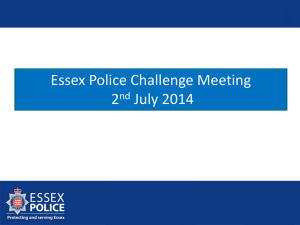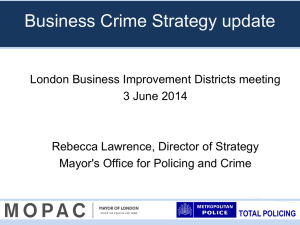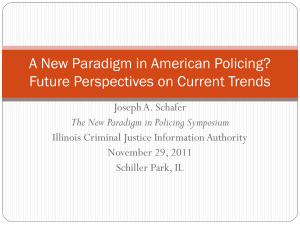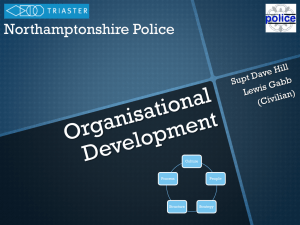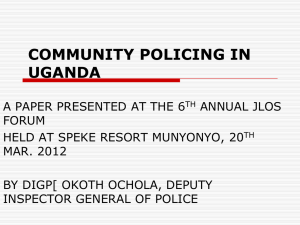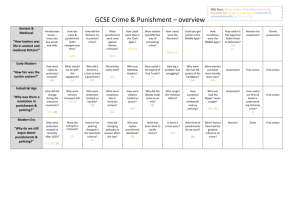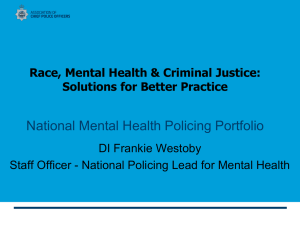Policing Globalization - Institute of European Studies
advertisement
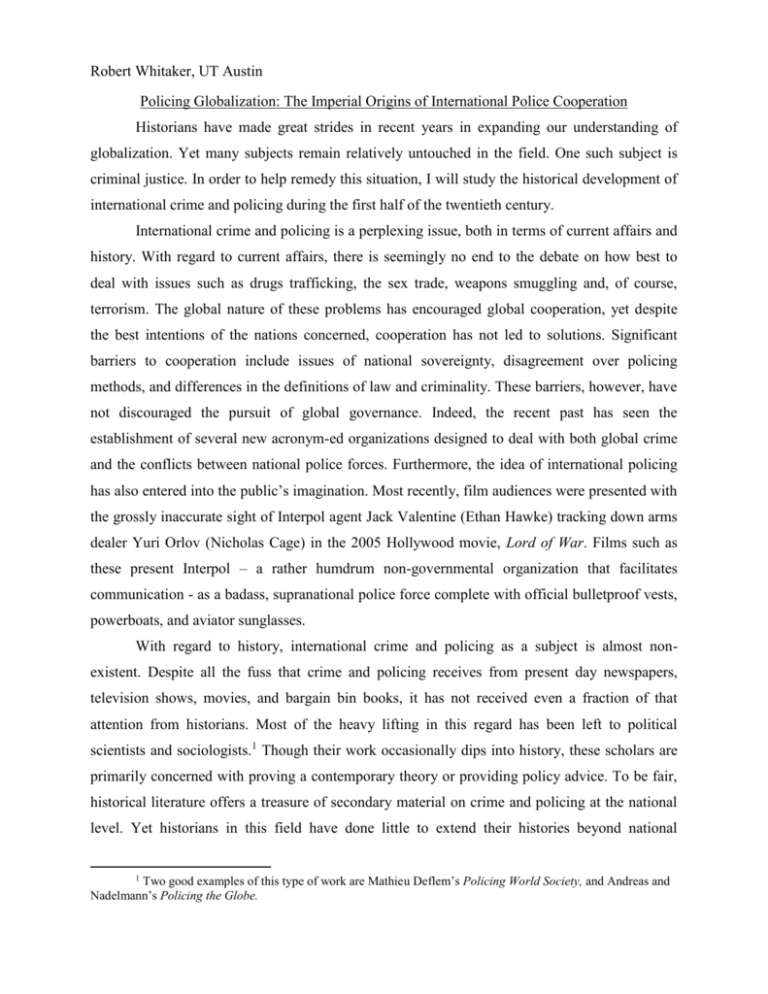
Robert Whitaker, UT Austin Policing Globalization: The Imperial Origins of International Police Cooperation Historians have made great strides in recent years in expanding our understanding of globalization. Yet many subjects remain relatively untouched in the field. One such subject is criminal justice. In order to help remedy this situation, I will study the historical development of international crime and policing during the first half of the twentieth century. International crime and policing is a perplexing issue, both in terms of current affairs and history. With regard to current affairs, there is seemingly no end to the debate on how best to deal with issues such as drugs trafficking, the sex trade, weapons smuggling and, of course, terrorism. The global nature of these problems has encouraged global cooperation, yet despite the best intentions of the nations concerned, cooperation has not led to solutions. Significant barriers to cooperation include issues of national sovereignty, disagreement over policing methods, and differences in the definitions of law and criminality. These barriers, however, have not discouraged the pursuit of global governance. Indeed, the recent past has seen the establishment of several new acronym-ed organizations designed to deal with both global crime and the conflicts between national police forces. Furthermore, the idea of international policing has also entered into the public’s imagination. Most recently, film audiences were presented with the grossly inaccurate sight of Interpol agent Jack Valentine (Ethan Hawke) tracking down arms dealer Yuri Orlov (Nicholas Cage) in the 2005 Hollywood movie, Lord of War. Films such as these present Interpol – a rather humdrum non-governmental organization that facilitates communication - as a badass, supranational police force complete with official bulletproof vests, powerboats, and aviator sunglasses. With regard to history, international crime and policing as a subject is almost nonexistent. Despite all the fuss that crime and policing receives from present day newspapers, television shows, movies, and bargain bin books, it has not received even a fraction of that attention from historians. Most of the heavy lifting in this regard has been left to political scientists and sociologists.1 Though their work occasionally dips into history, these scholars are primarily concerned with proving a contemporary theory or providing policy advice. To be fair, historical literature offers a treasure of secondary material on crime and policing at the national level. Yet historians in this field have done little to extend their histories beyond national Two good examples of this type of work are Mathieu Deflem’s Policing World Society, and Andreas and Nadelmann’s Policing the Globe. 1 Robert Whitaker, UT Austin borders.2 In addition, the types of crime and policing that these historians typically focus on are political in nature, and are most often aimed at exploring Foucauldian notions of control and order. While these histories may tell us something about the development of political violence and terrorism, they do little to help us understand the history of non-political crime and policing. Contributing to these conceptual issues are significant problems with regard to research. Criminals, funny enough, don’t typically leave written records (except, of course, with the police). Conversely, police, keep excellent records, yet are often less than enthusiastic about a nosey historian perusing them. Finally, there is the problem posed by methodology. How does one begin to approach a topic as nebulous and multifarious as this one and still hope to finish a dissertation in their lifetime? After much consideration, I believe that I have found a solution to all of these problems. I propose to write my dissertation on the development of international police organizations during the first half of the twentieth century. As described by historian Akira Iriye, the early part of the twentieth century saw a significant increase in the number of international organizations.3 These organizations underwent a great deal of expansion following the First World War, as nations attempted to foster international cooperation in order to solve common problems and avoid conflict. International crimes - particularly international anarchy, “white slavery” (the sex trade), and counterfeiting - were some of the key issues during this time period. These crimes encouraged the establishment of a number of international policing bodies, including the International World Police Organization, the International Police Chiefs Association, and the International Criminal Police Commission (ICPC, the precursor to Interpol). Many of these organizations, particularly the ICPC, have left behind a wealth of written material at national archives across the globe. By focusing my study on these organizations I will overcome both the problem of a narrow national focus as well as the issue of access to documents. Even with this focus on international police organizations, however, my project remains too broad for the purpose of a dissertation. There are simply too many countries and organizations to pursue. Thus I have decided to concentrate my analysis on the role of the United Kingdom in these developments. Britain is the most interesting and, perhaps, the most important 2 Exceptions include Mark Mazower, ed. The Policing of Politics in the Twentieth Century and Gerald Blaney Jr., ed. Policing Interwar Europe. 3 Akira Iriye, Global Community: The Role of International Organizations in the Making of the Contemporary World. Robert Whitaker, UT Austin area of research for several reasons. First, The United Kingdom was a prominent member in all of the aforementioned international policing bodies from their inceptions. As part of their position in these organizations, Britain was also instrumental in encouraging extra-European participation, particularly with regard to the United States and the members of the burgeoning Commonwealth of Nations. Furthermore, the United Kingdom also oversaw during this period the policing of crime in its Empire, a global concern in its own right. The interwar period found several officials, both within Britain and in the colonies, attempting to establish an imperial police association that could not only fight crime within the British Empire, but also coordinate with international bodies to fight crime globally. I regard the imperial dimension as the most crucial part of this project. Though still a small subject, imperial policing has received increasing attention over the past two decades, especially from historians David Anderson and David Killingray.4 Their work, however, not unlike the work relating to national policing, has remained concentrated on studying the maintenance of political law and order. More recently, historians Georgina Sinclair and Chris Williams have begun to explore the relationship between the policing of Empire and metropolitan Britain, but they have not connected that relationship to wider international developments.5 Based on my own preliminary research, it is my belief that the United Kingdom’s encouragement of international policing was based in large part on the experience of policing the Empire and that this enthusiams for international policing was driven by a desire to fight non-political crimes. If this is indeed the case, then an opportunity exists not only to link imperial efforts of policing with developments in Europe but to shed light on the development of non-political crime. The imperial perspective also provides the means to include the nonEuropean history of criminal justice, an aspect of the subject that is currently missing. For its part, criminal justice presents historians with an opportunity to analyze the relationship between globalization and national sovereignty in interesting ways (i.e. the sharing of sensitive material between ideologically opposed nations or the debate over whether or not Interpol should become a supranational force). In addition, criminal justice offers a way for historians to engage with political scientists and sociologists on the topic of globalization. Such work may help to bring together the study of globalization and turn it into a truly interdisciplinary field. 4 David Anderson and David Killingray, Policing the Empire and Policing and Decolonisation. Williams and Sinclair, “ ‘Home and Away’: The Cross-Fertillisation between ‘Colonial’ and ‘British’ Policing, 1921-1985,” JICH, 35:2, 221-238. 5
